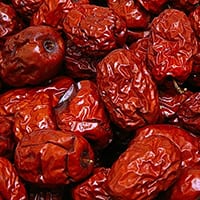
Jujube genome study sheds light on fruit tree’s domestication
The genome will serve as a resource for jujube breeders working on improved cultivars, as well as for researchers working on other fruit trees, such as apples.

The genome will serve as a resource for jujube breeders working on improved cultivars, as well as for researchers working on other fruit trees, such as apples.
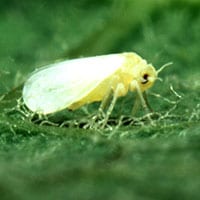
Researchers in the Fei lab have sequenced the genome of the whitefly, an invasive insect responsible for spreading plant viruses worldwide, causing billions of dollars in crop losses each year.

The NextGen Cassava project, a global partnership led by Cornell University that includes BTI Associate Professor Lukas Meuller, will now include cassava breeders from Tanzania.

Cultivating a disregard for day length enabled humans to introduce tomatoes to the Mediterranean region.

The collaboration works with breeding centers around the world to develop tools to make the process of adding a trait into an existing, high-yield crop variety more efficient.
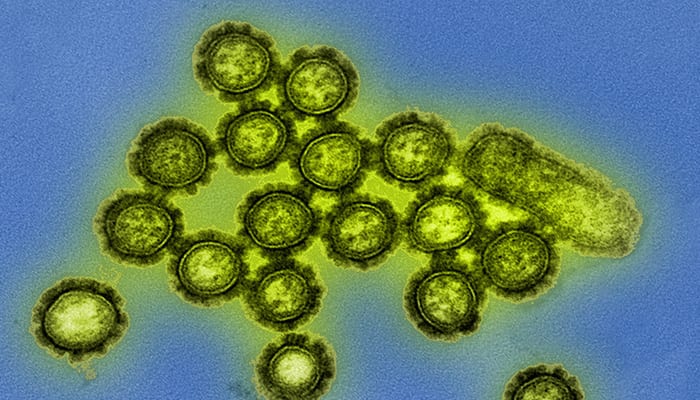
The Fei lab releases VirusDetect, an automated bioinformatics pipeline that efficiently detects viruses and viroids from large-scale, small RNA datasets.
Citrus growers are uniting to save their groves from citrus greening disease and to fund research into solutions, but growers in California face different challenges than those in Florida, report BTI and USDA researchers.

“Food security is a mixture of all the different aspects of agriculture. It’s not just growing the food,” said Proctor. “It’s not just planting something in the ground – there is a lot more to it.”

The recent Symposium explored plant science topics including molecular biology, atmospheric sciences, plant breeding and soil and crop sciences.

A new paper from the Cilia lab reports that the Asian citrus psyllid mounts an immune response against the bacterium that causes citrus greening disease – a discovery that may be useful for developing a treatment against the devastating epidemic.

Professor Greg Martin and colleagues received an NSF grant to pursue research into resistance against bacterial speck disease in tomatoes.
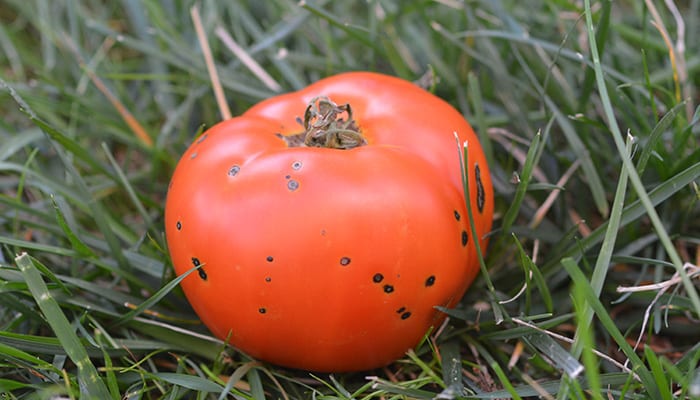
Researchers at BTI and Virginia Tech find a new bacterial detector in tomatoes that could help other crop plants to be more disease resistant.

An improved protocol cuts the time it takes to modify a tomato’s genome from 17 weeks to 11, accelerating research into ways to breed more productive crops.

BTI’s Gary Blissard and Michael Kanost of Kansas State University led a team of 114 researchers from 50 institutions and 11 countries to sequence the genome of this important insect model.

An international group of computer programmers gathered at BTI to create a single interface that will connect databases from breeding programs worldwide
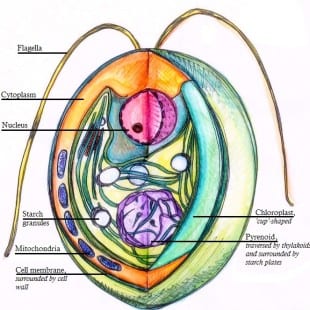
In a new paper in the Journal of Biological Chemistry, Stephen Campbell and David Stern show that chloroplast extracts from C. reinhardtii can cut an interrupting insertion from a protein, but only in the light.

By supporting STEM education efforts at BTI and other local institutions, Galvin aims to get young children excited about science and engineering.

When C. elegans larvae face starvation, they clump together in a mass of worms, which increases their lifespan. BTI researchers will explore this fascinating social behavior.
Despite its reputation for wreaking havoc in cells, singlet oxygen is also vital for triggering the repair of a key protein complex for photosynthesis.

A group of students and experts work together through video conferencing to identify the genes in the genome of the newly sequenced Asian citrus psyllid, the insect that spreads the bacterium that causes citrus greening disease.
An international consortium of researchers has sequenced the two wild parent species of the domesticated petunia
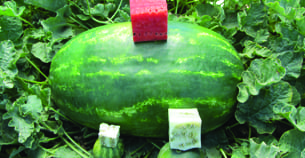
Watermelons have changed from a small, bitter fruit that grows wild in Africa to the most popular fruit in the world. What’s next for watermelons?
Mimicking the effects of a Guatemalan tuber moth infestation in agricultural fields could increase potato yield and reduce pest damage.

Jim Giovannoni, BTI professor, USDA-ARS research molecular biologist and Cornell University adjunct professor, is recognized by the National Academy of Sciences for his significant contributions to plant science.
A partnership with Tompkins Cortland Community College allows BTI to offer an evening biology class and gives grad students and postdocs an opportunity to teach their own class.
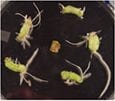
In a JOVE publication, postdoctoral researcher Thomas Jacobs uses tomato hairy roots to demonstrate how multiple CRISPR vectors can be constructed in parallel in a single cloning reaction.
Research from the Klessig lab shows that HMGB3 signals to the plant immune system when tissues are damaged and makes plants more resistant to certain infections.
Woodland agrimony is so rare in New York that there weren’t enough plants to study why it is in decline. The Van Eck lab used tissue culture techniques to multiply the plant.

Park honors his father’s legacy through his BTI board service and the Triad Foundation’s Plants and Human Health grant program.
Jander lab members investigate the chemical defenses that young corn plants use to fight off simultaneous attacks from hungry insects.
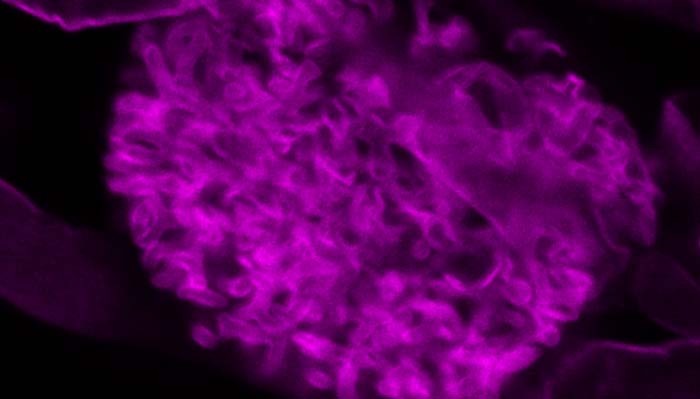
BTI researchers used a genome comparison approach to identify genes necessary for beneficial plant-fungal relationships, which may lead to better crop plants that require less fertilizer input.

Aphids thrive on a high-sugar diet, thanks to bacterial partners that help them breakdown plant sap and build essential amino acids from scratch.

The active ingredient in aspirin blocks an enzyme that triggers cell death in Alzheimer’s, Parkinson’s and Huntington’s diseases, offering hope for novel treatments.
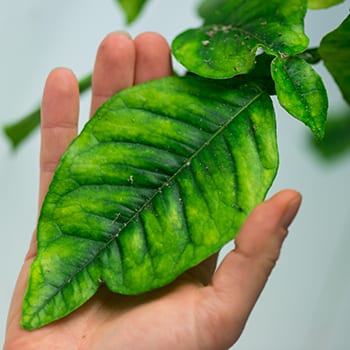
The bacterium believed to cause citrus greening disease creates multiple changes in both the Asian citrus psyllid that carries it and the beneficial bacteria that live within the insect.

The BTI tomato field experienced a damaging outbreak of bacterial speck disease this summer, but BTI’s Greg Martin has identified genetic regions in a wild tomato species that may make future varieties immune to these devastating bacterial strains.

A technique to enhance beta-carotene levels in potatoes and cassava may one day help alleviate vitamin A deficiency in developing countries.

A consortium of 20 researchers is using advanced genomic techniques to accelerate the development of disease-resistant varieties of cucurbit crops. BTI Associate Professor Zhangjun Fei will lead the bioinformatics and genomics part of the initiative.
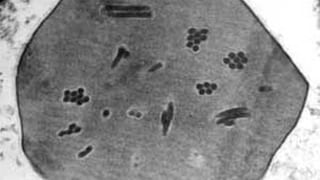
Most people get a daily dose of virus in the form of plant or insect viruses that are harmless to humans. Consuming the occasional plant or insect virus should be the least of our worries.

The detection of 10 new citrus greening disease cases in California citrus trees weighed heavily on attendees of a recent citrus greening research meeting.

The Cornell Nanoscale Facility would like to expand their collaborations with plant scientists.

BTI researchers Harrison and Floss collaborate with Cornell physicists to understand how roots grow around barriers in the soil, while still heading down.

Researchers have found that salicylic acid targets the activities of HMGB1, an inflammatory protein associated with a wide variety of diseases, offering hope that more powerful aspirin-like drugs may be developed.

Harrison Lab has discovered that plants use EXO70I to form a membrane around the fungus in arbuscular mycorrhizal (AM) symbioses, beneficial associations where plants receive phosphate from fungi in exchange for carbohydrates.

BTI Researchers pinpointed which genes are important at different stages of tomato fruit development by monitoring how gene expression changed in the first four days after a flower becomes pollinated.

When plants detect pheromones given off by nematode worms, they activate their immune system for protection. The chemical warning not only triggers defenses against nematodes, but also against bacterial, fungal and viral infection.

Professor James Giovannoni, “There’s a great deal of diversity that’s still available from these varieties that potentially have a lot of useful traits, including tolerance to stresses and important fruit traits.”

“The more we understand the molecular mechanisms involved in the infection process and in plant resistance, the more effective we’re going to be in breeding resistant crops,” said Professor Greg Martin.

A diverse group of researchers has teamed up to develop a therapeutic treatment for citrus greening disease, a bacterial infection that threatens the future of the U.S. citrus industry.

Researchers discover the genetics behind high-yield cucumbers that bear all-female flowers by screening 115 genome sequences to find large chromosomal variations.

EPA has granted temporary approval of two genes from spinach to be used in citrus plants. “There is a critical need to go beyond citrus to find novel resistance genes that provide protection…”